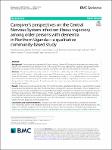| dc.identifier.citation | Benyumiza, D., Kumakech, E., Gutu, J., Banihani, J., Mandap, J., Talib, Z. M., ... & Obua, C. (2022). Caregiver’s perspectives on the Central Nervous System infection illness trajectory among older persons with dementia in Northern Uganda—a qualitative community-based study. BMC geriatrics, 22(1), 1-12. | en_US |
| dc.description.abstract | Background: Few studies have explored the Central Nervous System (CNS) infection illness trajectory among older
persons with dementia in sub-Saharan African (SSA) settings. This study explored the Caregiver’s perspectives on the
Central Nervous System infection illness trajectory among the older persons with dementia in Northern Uganda.
Methods: This was a qualitative study conducted in Lira District northern Uganda in March 2022 amongst purposively
selected 20 caregivers of the older persons aged 50 + years with a positive history of CNS infection and later life
dementia. Data were collected using an in-depth interview guide. Audio recordings and field notes of the interviews
were undertaken. The interviews generated data on the CNS infection illness trajectory from onset to the current
demented state of the older persons. The audio-recorded interviews were transcribed verbatim before manual reflective
thematic analysis.
Results: Older persons with a positive history of CNS infection illness and later life dementia in rural northern Uganda
presented with symptoms of early life CNS infection illness ranging from neck pain, back pain, chronic headache, and
fatigue. There were also manifestations of comorbidities particularly road traffic accidents involving traumatic injury to
the head, neck, and spine, high blood pressure, chronic headache, and or their medications in the older person’s trajectory
to later life dementia. A plurality of healthcare which included both formal and informal healthcare medicines
was sought and utilized for the treatment and care of the CNS infection illness and dementia by the older persons
amidst improper diagnosis and mismanagement.
Conclusions and recommendations: Older persons with early-life CNS infections illness and later-life dementia
were reported to present with symptoms including neck pain, back pain, chronic headache, high blood pressure, and
fatigue. The reported symptoms of CNS infection illness may be intertwined with co-morbidities particularly traumatic
injury involving the head, neck, and spine, high blood pressure, and chronic headache. Healthcare professionals should integrate routine screening of older persons for the history of CNS infections, chronic headache, high blood
pressure, trauma to the head, neck, and spine, and dementia and early treatment | en_US |

